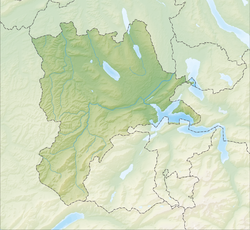Fischbach is a municipality in the district of Willisau in the canton of Lucerne in Switzerland.
Fischbach | |
|---|---|
 | |
| Coordinates: 47°9′N 7°54′E / 47.150°N 7.900°E | |
| Country | Switzerland |
| Canton | Lucerne |
| District | Willisau |
| Area | |
• Total | 8.05 km2 (3.11 sq mi) |
| Elevation | 637 m (2,090 ft) |
| Population (31 December 2018)[2] | |
• Total | 711 |
| • Density | 88/km2 (230/sq mi) |
| Time zone | UTC+01:00 (Central European Time) |
| • Summer (DST) | UTC+02:00 (Central European Summer Time) |
| Postal code(s) | 6145 |
| SFOS number | 1129 |
| ISO 3166 code | CH-LU |
| Surrounded by | Ebersecken, Gondiswil (BE), Grossdietwil, Ufhusen, Zell |
| Website | http://www.fischbach-lu.ch Profile (in German), SFSO statistics |
History
editFischbach is first mentioned in 1224 as Viscebach.[3]
Geography
editFischbach has an area, as of 2006[update], of 8.1 km2 (3.1 sq mi). Of this area, 80.6% is used for agricultural purposes, while 13.9% is forested. Of the rest of the land, 5.3% is settled (buildings or roads) and the remainder (0.1%) is non-productive (rivers).[4] In the 1997 land survey[update], 13.81% of the total land area was forested. Of the agricultural land, 76.99% is used for farming or pastures, while 3.73% is used for orchards or vine crops. Of the settled areas, 3.11% is covered with buildings, 0.25% is classed as special developments, and 1.99% is transportation infrastructure.
The municipality is located in the hill country near the Rot river valley.
Demographics
editFischbach has a population as of 2008[update] of 716, of which 68 or about 9.5% are not Swiss citizens.[5] Over the last 10 years the population has grown at a rate of 2.5%. Most of the population (as of 2000[update]) speaks German (94.0%), with Albanian being second most common ( 3.8%) and Serbo-Croatian being third ( 0.9%).
In the 2007 election the most popular party was the CVP which received 50.7% of the vote. The next three most popular parties were the SVP (30.7%), the FDP (12.7%) and the Green Party (2.7%).
The age distribution, as of 2008[update], in Fischbach is; 206 people or 28.8% of the population is 0–19 years old. 188 people or 26.3% are 20–39 years old, and 215 people or 30% are 40–64 years old. The senior population distribution is 83 people or 11.6% are 65–79 years old, 18 or 2.5% are 80–89 years old and 6 people or 0.8% of the population are 90+ years old.[6]
The entire Swiss population is generally well educated. In Fischbach about 57% of the population (between age 25-64) have completed either non-mandatory upper secondary education or additional higher education (either university or a Fachhochschule).
As of 2000[update] there are 223 households, of which 37 households (or about 16.6%) contain only a single individual. 50 or about 22.4% are large households, with at least five members.[6] As of 2000[update] there were 158 inhabited buildings in the municipality, of which 84 were built only as housing, and 74 were mixed use buildings. There were 61 single family homes, 13 double family homes, and 10 multi-family homes in the municipality. Most homes were either two (43) or three (22) story structures. There were only 15 single story buildings and 4 four or more story buildings.[6]
Fischbach has an unemployment rate of 1.6%. As of 2005[update], there were 114 people employed in the primary economic sector and about 42 businesses involved in this sector. 49 people are employed in the secondary sector and there are 6 businesses in this sector. 26 people are employed in the tertiary sector, with 8 businesses in this sector.[4] As of 2000[update] 51% of the population of the municipality were employed in some capacity. At the same time, females made up 37% of the workforce.
In the 2000 census[update] the religious membership of Fischbach was; 475 (70.1%) were Roman Catholic, and 122 (18.%) were Protestant, with an additional 6 (0.88%) that were of some other Christian faith. There is 1 individual(0.15% of the population) who is Jewish. There are 37 individuals (5.46% of the population) who are Muslim. Of the rest; there were 2 (0.29%) individuals who belong to another religion (not listed), 15 (2.21%) who do not belong to any organized religion, 20 (2.95%) who did not answer the question.[6]
The historical population is given in the following table:[3]
| year | population |
|---|---|
| about 1695 | ca. 300 |
| 1798 | 500 |
| 1850 | 801 |
| 1860 | 693 |
| 1870 | 766 |
| 1900 | 676 |
| 1950 | 761 |
| 1990 | 631 |
| 2000 | 678 |
References
edit- ^ a b "Arealstatistik Standard - Gemeinden nach 4 Hauptbereichen". Federal Statistical Office. Retrieved 13 January 2019.
- ^ "Ständige Wohnbevölkerung nach Staatsangehörigkeitskategorie Geschlecht und Gemeinde; Provisorische Jahresergebnisse; 2018". Federal Statistical Office. 9 April 2019. Retrieved 11 April 2019.
- ^ a b Fischbach in German, French and Italian in the online Historical Dictionary of Switzerland.
- ^ a b Swiss Federal Statistical Office Archived January 5, 2016, at the Wayback Machine accessed 25-Aug-2009
- ^ LUSTAT-Canton Lucerne Statistical Office Archived February 29, 2012, at the Wayback Machine (in German) accessed 25 August 2009
- ^ a b c d LUSTAT Lucerne Cantonal Statistics Archived November 27, 2011, at the Wayback Machine (in German) accessed 12 August 2009
External links
edit- Fischbach in German, French and Italian in the online Historical Dictionary of Switzerland.




